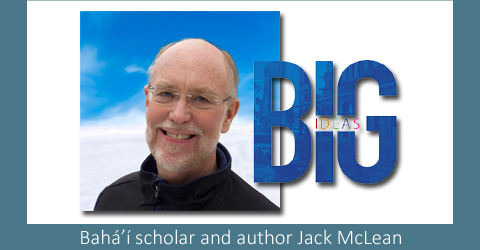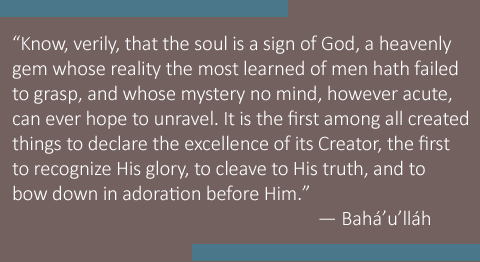 |
 |
|
June 20, 2022 Mind, Body and Spirit: The Journey of the Soul Speak thou no word of politics; thy task concerneth the life of the soul, for this verily leadeth to man’s joy in the world.” — ‘Abdu’l‑Bahá 
Prior to drinking the hemlock as punishment for impiety and corrupting the youth of Athens, when the philosopher Socrates stood before the judges, in his defense he stated that death was either total annihilation and a release from worry or a promotion to a higher plain of existence. He said that he looked forward to meeting with the great departed figures of Ancient Greece such as Homer, the poet Hesiod and the hero Odysseus. Bahá’í scholar and author Jack McLean prefaced his talk on the nature and journey of the soul by stating his belief in the soul, and that to him, if there’s no immortal soul, what ‘s the point of the journey (of life)? He delved into the teachings on the nature of the soul by the three great ancient Greek philosophers (Socrates, Plato and Aristotle), whose teachings are the foundation of so much of Western philosophy and the sciences today. Bahá’ulláh, the prophet-founder of the Bahá’í Faith, wrote that Socrates was the most distinguished of all philosophers. Socrates stated that the soul is an immortal entity, a rational soul capable of thought and expression independent of the human body, teachings he gleaned from Jewish sages he had met who taught him the oneness of God according to ‘Abdu’l-Bahá, the son of Bahá’u’lláh. Plato further developed the concept of the soul in his Republic, associating it with three parts of the body: the head (reason and logic), the heart (emotion and virtues), and the stomach and reproductive organs (appetites). Aristotle, on the other hand, believed that the soul was the form of the body, which disintegrates at death. However, he also believed that parts of the soul survived death and was different from the body it inhabited, but in what capacity is not clear. Bahá’u’lláh, who Bahá’í’s believe is the newest divine Messenger in a long line of prophets and messengers dating back to Adam, takes us on a deep dive into the mystical and unfathomable essence of the soul: “Know, verily, that the soul is a sign of God, a heavenly gem whose reality the most learned of men hath failed to grasp, and whose mystery no mind, however acute, can ever hope to unravel. It is the first among all created things to declare the excellence of its Creator, the first to recognize His glory, to cleave to His truth, and to bow down in adoration before Him.”  According to ‘Abdu’l-Bahá, the soul has two faculties, the physical and the spiritual, explaining that “As outer circumstances are communicated to the soul by the eyes, ears brain of a man, so does the soul communicate its desires and purposes through the brain to the hands and tongue of the physical body, thereby expressing itself. The spirit of the soul is the very essence of life. With regards to mental faculties, He explains that “they are in truth of the inherent properties of the soul, even as the radiation of light is the essential property of the sun.” And even if the intellect weakens and changes, the soul remains unchanged. Although the body’s atoms disintegrate and disperse at death, the soul, which is an indivisible essence, is eternal and can never be destroyed. ‘Abdu’l-Bahá also asserts that although the human being carries within it the mineral, vegetable and animal kingdoms, “… the superiority of man over the rest of the created world is seen again in this, that man has a soul in which dwells the divine spirit...” Although both Bahá’u’lláh and ‘Abdu’l-Bahá confirm that the soul is endowed with reason, it is only one of the functions of the soul. It has intrinsic powers that transcend and surpass reason alone. To be fully human, however, and to gain eternal life, the soul must be filled by the spirit of faith. To McLean, the worst definition of faith is to believe in what you know isn’t true, while the best definition is conscious knowledge, since faith is a form of knowledge. The spirit in the soul is the very essence of life. In other words, the soul lives through the agency of the body, but also in the world of (inner) vision. Above and beyond the divine and unfathomable essence of the soul, what is its purpose? ‘Abdu’l-Bahá states that the purpose of the soul is to acquire virtues in this world, so that we may put them to good use and build the world anew, and to unite humanity. And when a human being dies, the soul remains in the state of purity it achieved until that moment and is “plunged in the ocean of God’s mercy,” and is ever moving closer towards God. Bahá’u’lláh states that “if the soul of man hath walked in the ways of God, it will assuredly return and be gathered to the glory of the Beloved…and will attain a station such as no pen can depict, or tongue describe […] meditate on this, and be of the thankful.” This article only skims the surface of Jack McLean’s very rich talk on the nature and journey of the soul, so if you want to know more, please view the video available on Big Ideas. Here |
|
|